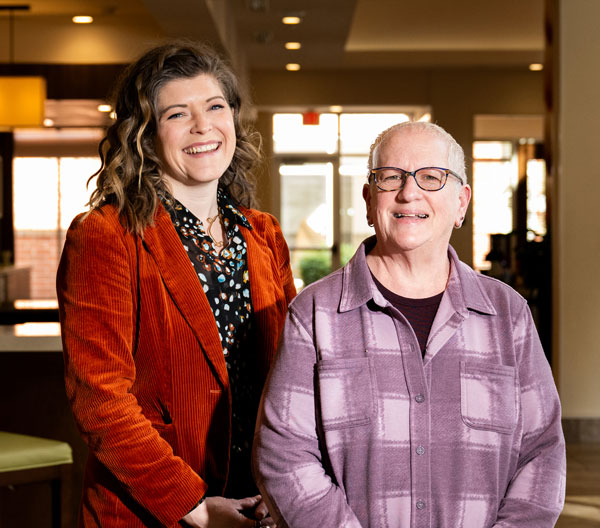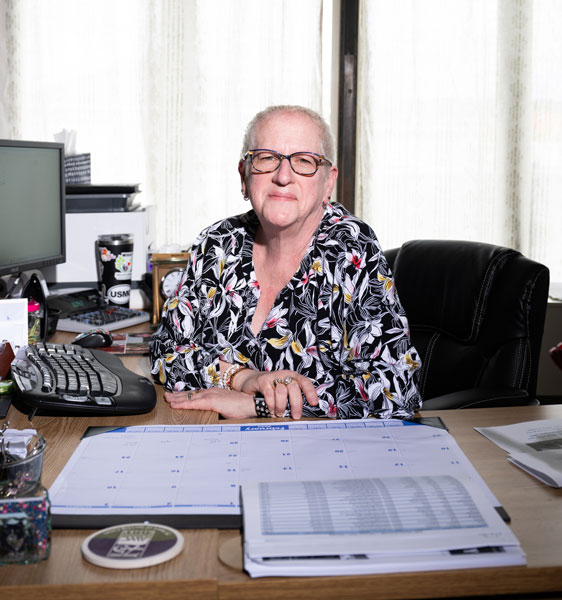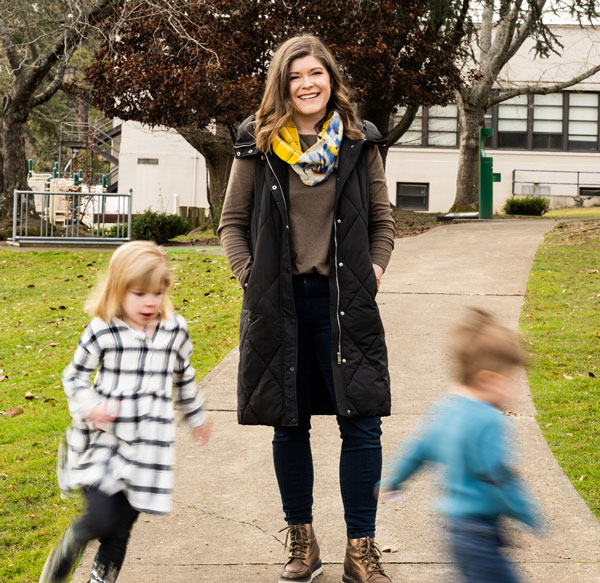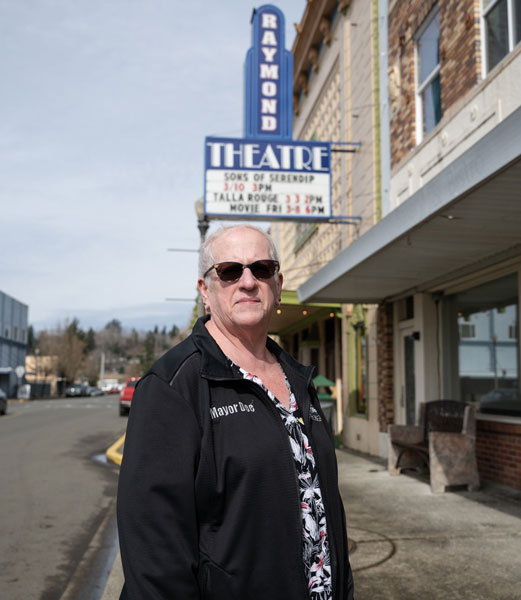AWC’s new board members model the shared experiences and leadership skills that make rural communities strong.
By: Sarah Chase Shaw

White Salmon Mayor Marla Keethler and Raymond Mayor Dee Roberts at the AWC Mayors Exchange in Olympia in February. Credit: Chona Kasinger
White Salmon (motto: “The Land Where the Sun Meets the Rain”) might be overlooked by visitors to Hood River--its more popular and populous neighbor across the Columbia River in Oregon, but it’s evolving as one of the Gorge’s hottest vacation destinations. Known for craft beer and local wine, White Salmon’s main street bustles with cafes and bakeries, tasting rooms, a boutique hotel, a gourmet market, and artisan restaurants. The tens of thousands of annual visitors the town attracts eclipse its population of 2,601 year-round residents. Like Hood River and other destination resort communities, one of the most pressing issues confounding the city’s leaders is a shortage of affordable housing.
Three hours and 180 road miles northwest on the Long Beach Peninsula in Pacific County, the rural City of Raymond—a self-described former “wild and woolly lumber mill town”— has experienced a similar rebirth as a tourism destination. While logging and fishing remain strong economic drivers, Raymond’s economy has expanded to include a thriving craft beverage sector and a live music scene to complement an influx of cannabis manufacturing jobs that followed the legalization of marijuana in 2012. On the Long Beach Peninsula, as in the Columbia River Gorge, tourism now drives the local economy, and a dearth of affordable housing threatens the livability and livelihood of Raymond and its 3,081 residents. In Raymond, where the median household income is $49,034, the median price of a home listed for sale has surged by 27% from the previous year to $330,000—driven in part by a post-pandemic migration of work-from-home professionals liberated from big-city offices.
As AWC notes in the introduction of its Small City Resource Manual, rural enclaves like Raymond and White Salmon (57% of Washington’s 281 cities have populations of 5,000 or less) represent “the historical and cultural bedrock of American life.” Their citizens—both long-term residents and recent transplants—are deeply invested in the future of their community. As is the case in highly desirable locales, locals often bemoan the changes they’re witnessing, blaming newcomers for the inherent disruptions, demands, and demographic and economic shifts that come with a changing socio-economic structure. Newer residents, excited to embrace the small-town ambiance and embed themselves in the fabric of their adopted community, offer new ways of addressing old problems that are not always welcomed by locals pining for the status quo.
In fact, given that 161 of Washington’s 281 cities and towns have a population under 5,000, the “at large” positions on the AWC Board representing small cities are important. Not only do these positions represent the shared realities of governance in a small city or town, but they actively serve as ambassadors and provide a voice for Washington’s smallest cities and towns.
Small cities differ from their larger urban counterparts in a lot more than just size. In smaller communities, elected officials are highly integrated—without the benefit of lots of people and bureaucracy as camouflage. The grocery store, the soccer field, the movie theater, the local diner, and city hall: these are places where public officials rub elbows with constituents eager to opine about the goings-on of local government. For their part, public officials must always be ready and able to communicate openly and honestly with everyone and anyone—be it business competitors, neighbors, friends, or political rivals. “In fact, the challenges are sometimes greater in small communities because they must deal with the ever-more-complex laws and regulations of the 21st century without the specialized staff of larger cities,” stresses the Small City Resource Manual. “In small cities, the clerk might be part-time, [while working as] the mayor, the chief grant writer, and the public works director, a ‘one-person show.’”
Small cities differ from their larger urban counterparts in a lot more than just size.

Raymond Mayor Dee Roberts in her office at city hall. Credit: Chona Kasinger
Few people know small city governance better than Dee Roberts, the mayor of Raymond. She was elected in 2022 after spending 24 years working in the city hall of neighboring South Bend (located 10 minutes by car to the west), as deputy clerk/treasurer, and then as clerk/treasurer. She still held that post when she was sworn in as Raymond’s mayor in January 2022, during a historic flood that had her flitting between city halls, multitasking to meet the needs of two communities in crisis. “At one point, I just sat in my car because I was like, ‘I don’t even really know where I’m supposed to be right now,’” recalls Roberts, now halfway through her first term. “I was just overwhelmed. I was beside myself.”
She happily retired as Raymond’s clerk/treasurer that May, but it was her front-office experience as a city hall administrator that uniquely qualified and prepared Roberts for the challenges of leading Raymond as mayor. “I love my community and I want to see it succeed,” says Mayor Roberts, who in February was appointed to AWC’s Board of Directors, to be the “at large” representative for all 57 small cities and towns in Western Washington. “I wanted to use my knowledge for the betterment of the community.”
Likewise, with a successful career as a sports television producer based in New York City, Marla Keethler was uniquely prepared to be a small-town local elected—serving first on White Salmon’s council in 2018, then becoming mayor in 2020.
“A lot of different positions I held in broadcasting were about project management; I would oversee a whole team or crew to make sure certain shows had what they needed to go to air,” says Keethler, who relocated from New York back to her native Washington in 2016. When she and her husband were unable to find housing in Hood River, they chose to settle in White Salmon, and Keethler put those skills to good use. “In local government, the administration benefits when someone’s in there who can keep things on task and deadline.”
In local government, the administration benefits when someone’s in there who can keep things on task and deadline.

Keethler during a break at the Mayors Exchange. Credit: Chona Kasinger
As a television producer, Keethler also learned to understand the importance of building cohesion within a team that is working toward a shared goal. “The same issues apply to being the mayor of a small town,” she adds. “What I learned in those jobs continues to inform my approach as mayor today: trust is integral to working on a team. You need to maintain respect for an established chain of command and the order in which decisions are made, because when you're on air broadcasting a live event, you have seconds to make decisions.”
Finding common ground about issues of paramount importance to the community is key to any mayor’s success, Keethler observes. “If you want to build a strong community, you have to make all community members feel valued.”
When Keethler took office as mayor, one of White Salmon’s two mobile home developments was in the process of closing, and the property owner had given residents a year to find alternative housing. While the city council couldn’t stop the process, it did implement a housing moratorium—essentially, Mayor Keethler explains, to call attention to the affordable housing crisis in the community. Doing so allowed White Salmon’s council to change the mobile home zoning code to prevent any future land use changes on similar developments.
What emerged from that process, she continues, was a more formal organization of White Salmon’s Spanish-speaking community, supported by a Gorge-based social and environmental justice nonprofit organization to give members of White Salmon’s Latino community a voice in local government. That support included offering public speaking lessons on how to effectively engage an audience at a city council meeting.
“It was incredibly compelling to hear these residents speak to their experience,” recalls Keethler, who was re-elected to a second term in November 2023 and, like her Raymond counterpart, was also appointed to AWC’s Board in February as an “at large” representative for Eastern Washington’s 104 small towns and cities.
“Since then, the city has expanded its public outreach via Facebook Live and other online and in-person forums where residents can ask questions of staff or experts about various issues of concern. “Creating spaces where people feel more comfortable has been really beneficial for our town,” she says.

Keethler in White Salmon with her daughter, Bailey, and son, Charlie. Credit: Chona Kasinger
When Dee Roberts became Raymond’s mayor (after serving on the city council for 14 years), citizens initially were wary, she says, because they did not feel that city leaders had been truthful with them in the past. “So, I made it a priority to do everything in my power to be as transparent as possible. If there are things that I feel the citizens should know, I make it as public as I can.”
In Raymond, although progress has been made on housing (since Roberts’ election in 2022, the city has received grants totaling $241,000 from the Washington Department of Commerce’s Connecting Housing Infrastructure Program to jump-start the construction of 47 affordable units), finding common ground on issues of equity and inclusion has been more challenging. Roberts notes that the pandemic shift from in-person gatherings to remote meetings, digital forums, social media, and electronic communication has created an atmosphere of distrust, disrespect, and disagreement in her community. Now more than ever, she says, “It’s easy for people to say horrible things about you on social media or email you with personal insults. But if it’s something that you truly believe in, you have to be committed to overlook all of that in favor of the work you are doing.”
It’s easy for people to say horrible things about you on social media or email you with personal insults. But if it’s something that you truly believe in, you have to be committed to overlook all of that in favor of the work you are doing.
Roberts put that conviction to a public test last June, when she purchased a Pride flag and flew it with the American flag on the pole outside city hall to recognize Raymond’s significant LGBTQ community during Pacific County Pride Week.
“A segment of the community was vehemently opposed to my decision to fly the flags together,” she recalls. “There was no way I could convince them to see it differently; they had made up their minds.”

Roberts outside the city-owned Raymond Theatre. Credit: Chona Kasinger
When the city hosted a family-friendly drag show and Pride parade at the Raymond Theatre in June, a group of community members assembled outside with protest signs (“Drag Is Not For Kids,” “Don’t Drag Our Children Down”), with some accusing participants of doing “terrible things.” Roberts acknowledges that her mistake was not recognizing how strongly a minority of the population felt about the issue. “They were vocal, they were disrespectful, and they were very angry with me,” she says. “I was committed to the decision that I made at the time, and I would not change it now.”
Similarly, while serving on White Salmon’s council in 2019, Keethler voted in favor of a declaration designating June as Pride Month in support of her city’s LGBTQ community.
“That didn’t pass, which surprised me, because it didn’t seem to reflect what a lot of residents felt was their experience living in our community,” she recalls. “Ultimately, we brought the vote back at a subsequent meeting and the proposal did pass. In addition, we adopted a declaration of inclusivity, which ironically had been shot down a couple of years prior as well. The result of this is now an intentionality around creating space for opinions, whether it’s in our public hearings or in the different outreach we do around specific issues.”
Both small city mayors readily admit that learning to trust others in city government was initially challenging, but necessary. “Establishing an understanding of, and respect for, decision-makers allows you to respond appropriately,” says Keethler. And Roberts, who was used to working the front lines as a department head in a small city, notes that, “It took a while to realize that I had to stay in my lane, which was difficult because I worked for so long on the other side,” she says. “I forgot that, as mayor, it wasn’t my responsibility to take care of everything.”
It took a while to realize that I had to stay in my lane, which was difficult because I worked for so long on the other side.
Their advice to those newly elected?
Do the hardest thing first, offers Keethler. “If you are certain it needs to be done, prolonging action won't make it easier. And, more often than not, treat listening as more important than speaking.”
For Roberts, it’s about simple time management. “Everything takes twice as long as you think it will, and there is no such thing as a part-time mayor, no matter what they tell you.”
As seasoned small town local electeds, these two women both reap, and cherish, the benefit of perspective—and the opportunity to represent the vital voices of Washington’s small cities and towns.
“Having served a full term as mayor, the thing that stands out to me is that while small towns share many of the same challenges as larger communities, they have significantly fewer resources and time to spend trying to tackle them,” Keethler concludes. “That’s really challenging, but in so many ways, it’s also rewarding when you can actually see progress.”